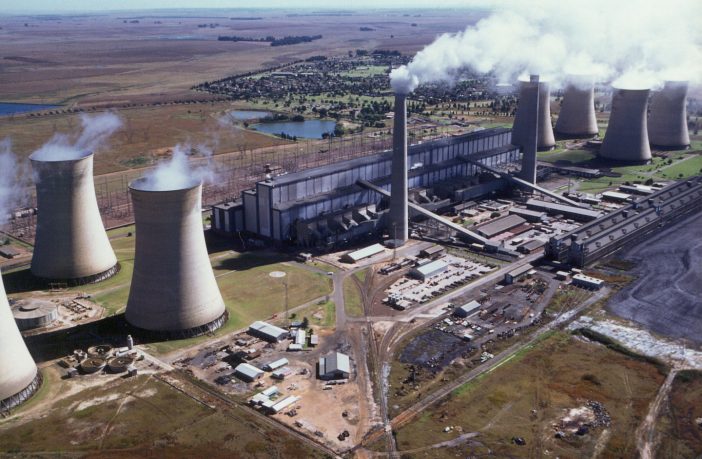- Greenpeace Africa has commissioned a study outlining workable solutions for South African parastatal Eskom, which could help with the country’s electricity supply industry crisis.
- The study titled, ‘Eskom: A roadmap to powering the future’ by Energy Economist, Prof. Dr Uwe Leprich, provides a clear roadmap for the sinking utility’s reform and adaptation.
“Fundamental reforms of the South African electricity sector and Eskom’s business model are inevitable and urgent. This report presents a roadmap with solid options for the country’s electricity supply industry crisis, outlines a realistic and sustainable future for Eskom, and ensures that all crucial functions of the South African electricity system improve,” said Happy Khambule, Greenpeace Africa’s Senior Political Advisor.
Key recommendations for Eskom’s reform include:
- The gradual phase-out of coal-fired power generation from Eskom to new generation companies (GenCos), which will operate the power plants for the remainder of their operating time on the basis of precisely defined conditions (e.g. a coal phase-out by 2040);
- The refinancing of Eskom through the decommissioning of coal-fired power stations older than 40 years, and the sale of all remaining coal-fired power plants; with very strict conditions in terms of their compliance with existing air quality and environmental regulations, and clear timelines for their closure. In principle, it must be considered whether private companies should also be invited to buy shares of the coal plants, or whether only public companies should have the right to participate in the auctions for the plants.
- The retention by Eskom of the important role of the transmission system operator (TSO) with the possibility of operating its own grid-supporting (non-coal) power plants;
- The opening of the IPP auctions for renewable energies to Eskom as well in order to make it a significant part of the utility’s business model;
- The possibility for Eskom to participate in the newly created six regional electricity distributors (REDs); and
- The opportunity for Eskom to create new services for end-use customers on the basis of the digitalisation revolution that is evolving all over the world.
Implementing these recommendations would give Eskom an opportunity to stabilise its economic situation, reduce its debt and become a constructive promoter of the necessary transition of the electricity sector to renewable energy in South Africa.
“Eskom’s reform is almost laughably overdue; the utility is technically insolvent, inefficient, unable to guarantee security of supply, wildly unprepared for an energy transition to renewable energy and is the country’s biggest emitter of toxic pollutants and greenhouse gases, which are driving us towards a climate and pollution emergency,” said Happy Khambule, Greenpeace Africa’s Senior Political Advisor.
Eskom repeatedly exceeds its carbon emissions limits. Read more
The report follows several international experiences and trends of phasing out coal, and unbundling and breaking up absolute monopolies in the electricity sector. It also proposes the introduction of an independent transmission operator to improve the security of electricity supply and provide fair access for new renewable power plants such as wind and solar.
“Now, the new administration needs to prove their credibility and that their pre-electoral promises about the reform of Eskom and the electricity sector were not merely cheap electioneering tactics. The decisions that need to be taken about Eskom’s future will not be easy, but it is the government’s responsibility to ensure that a bold shift to renewable energies, with Eskom as a public good at the centre, becomes a reality. If they do so, and create and implement a Just Transition framework, South Africa’s electricity sector can only flourish,” ended Khambule.
About the paper’s author
Born 1959 in North Rhine Westphalia, Germany, Prof. Dr. Uwe Leprich finished his Ph.D. in Economics at the University of Bielefeld in 1993. In 1995 he was appointed to a professorship at the business school of the University of Applied Sciences in Saarbruecken where he teaches economics, economic policy and energy policy. In 1998/99 he co-founded the Institute for Future Energy Systems (IZES), a university based research institute focussing on renewable energies, energy efficiency and decentralised power generation, where he served from 2008 till 2016 as a scientific director. In April 2016 he switched to the German Environment Agency where he served as the head of the department of Climate Protection and Energy for two years. His fields of specialisation embrace economic and ecological regulations of utilities in monopoly and liberalised energy markets as well as environmental instruments for electricity markets. He is author and co-author of several books and articles about incentive regulation in electricity markets, feed-in law regulations and instruments for promoting renewable energies in the heat market.
He was an expert member of the Enquete commission “Sustainable energy supply” of the 14th German Bundestag in 2001/02, and since January 2010 he is an Alternate Member of the Administrative Board of the Agency for the Cooperation of Energy Regulators (ACER) of the European Union.











